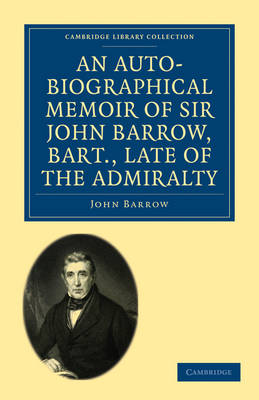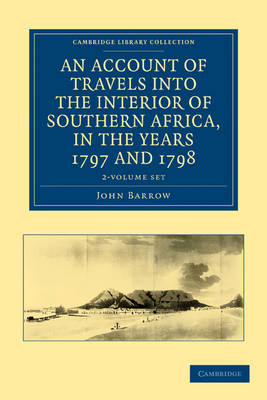Cambridge Library Collection - African Studies
2 primary works • 4 total works
Volume 1
An Account of Travels into the Interior of Southern Africa, in the Years 1797 and 1798: Volume 1
by John Barrow
Published 22 September 2011
Sir John Barrow (1764-1848) was a distinguished British government servant whose diplomatic career took him to China and Africa, and who in forty years as Secretary to the Admiralty was responsible for promoting Arctic and Antarctic exploration, including the voyages of Sir John Ross, Sir William Parry, Sir James Clark Ross and Sir John Franklin. This account of his time in Southern Africa was published in 1801, with a second volume following in 1804. Barrow's exploration of the Cape Colony in 1797-8 coincided with the imposition of British control in 1795 on a former Dutch colony, making this work an important source about this transitional period. Volume 1 begins with the history of the Cape of Good Hope, and its natural features, climate and inhabitants. Barrow then describes his journey inland, through the Karroo desert region, and his encounters with the European and African peoples who lived there.
Volume 2
An Account of Travels into the Interior of Southern Africa, in the years 1797 and 1798: Volume 2
by John Barrow
Published 22 September 2011
Sir John Barrow (1764-1848) was a distinguished British government servant whose diplomatic career took him to China and Africa, and who in forty years as Secretary to the Admiralty was responsible for promoting Arctic and Antarctic exploration, including the voyages of Sir John Ross, Sir William Parry, Sir James Clark Ross and Sir John Franklin. This account of his time in Southern Africa was published in 1801, with a second volume following in 1804. Barrow's exploration of the Cape Colony in 1797-8 coincided with the imposition of British control in 1795 on a former Dutch colony, making this work an important source about this transitional period. Volume 2 takes a political focus, and elaborates Barrow's belief that the Cape of Good Hope could serve the commercial interests of the growing British empire in the east; he also discusses the strategic advantages of stationing troops along the Cape.
An Auto-Biographical Memoir of Sir John Barrow, Bart, Late of the Admiralty
by John Barrow
Published 20 July 2009
Sir John Barrow (1764-1848) was a distinguished British government servant whose diplomatic career took him to China and Africa, and who in forty years as Secretary to the Admiralty was responsible for promoting Arctic and Antarctic exploration, including the voyages of Sir John Ross, Sir William Parry, Sir James Clark Ross and Sir John Franklin (the last of which famously ended in disaster). Barrow's autobiography, written when he was eighty-three, depicts a life extraordinary for its range of experience and activity, from a small farm in the Furness peninsula to the court of the Emperor of China, and from an apparently settled life as a civil servant at Cape Town to the centre of affairs at a time when the British Navy's reach and influence reached their highest point. This fascinating account will be of interest to anyone interested in exploration and the history of the British Navy.
An Account of Travels into the Interior of Southern Africa, in the Years 1797 and 1798 2 Volume Set
by John Barrow
Published 22 September 2011
Sir John Barrow (1764-1848) was a distinguished British government servant whose diplomatic career took him to China and Africa, and who in forty years as Secretary to the Admiralty was responsible for promoting Arctic and Antarctic exploration, including the voyages of Sir John Ross, Sir William Parry, Sir James Clark Ross and Sir John Franklin. This account of his time in Southern Africa was published in 1801, with a second volume following in 1804. Barrow's exploration of the Cape Colony in 1797-8 coincided with the imposition of British control in 1795 on a former Dutch colony, making this work an important source about this transitional period. Volume 1 begins with the history of the Cape of Good Hope, and its natural features, climate and inhabitants. Volume 2 elaborates Barrow's belief that the Cape of Good Hope could serve the commercial interests of the growing British empire.


